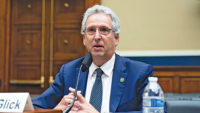As hurricane season approaches, executives of New Jersey infrastructure agencies and the industry firms that work for them question whether they are doing enough to pressure politicians and other purse-string holders for more infrastructure-resiliency funding in the wake of 2012's Superstorm Sandy.
"You have to link to people that cut checks and look a generation ahead," Fred Sickels, acting director for drinking water at the New Jersey Dept. of Environmental Protection, told attendees at a May 7 resiliency conference, sponsored by engineer HMM, in Iselin, N.J. "Engineers have to communicate to policy- makers. Funding it will be a challenge."
Donald Cresitello, senior project planner for the U.S. Army Corps of Engineers' New York district, said the agency "needs to do a better job" of showing how the agency is incorporating resiliency into its projects for local jurisdictions with coastal vulnerability.
The woes of coastal infrastructure are not trumpeted as loudly as transportation's are in vehicles such as the American Society of Civil Engineers' annual report card, said William Hanson, vice president of Great Lakes Dredge and Dock, which is involved in coastal restoration. He said New Jersey's dedicated beach replenishment fund is a key catalyst for municipalities to gain added federal funding for local projects. The firm now is developing a national analysis of coastal vulnerabilities that Hanson hopes will gain attention from states and cities.
Paul Sarlo, a New Jersey contractor and assistant state senate majority leader, told attendees that the state is the only one in the Northeast without a climate-adaptation plan. He said Gov. Chris Christie (R) has been "reluctant" to authorize the state DEP to move on that plan.
However, some state agencies hard-hit by Sandy, such as New Jersey Transit, have fared better in their funding for long-term resilience. Eric Daleo, agency resilience director, told conferees it received a third of the funding total offered to states in a Federal Transit Administation resiliency funding competition. "Our system had significant vulnerability," he said.






Post a comment to this article
Report Abusive Comment